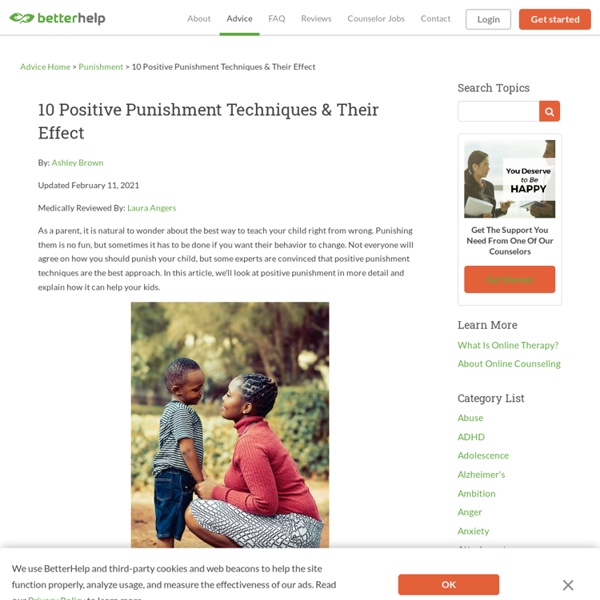How Negative Punishment Works
Negative punishment is an important concept in B. F. Skinner's theory of operant conditioning. In behavioral psychology, the goal of punishment is to decrease unwanted behavior. In the case of negative punishment, it involves taking something good or desirable away to reduce the occurrence of a particular behavior.
Rewarding behavior is key to parenting teens, study suggests
Parenting is hard, and parenting teens brings about an entirely new set of challenges, from keeping their rooms clean to getting them home before curfew. But, a new study suggests parents who want their teenagers to keep their grades up could have better success if they focus more on rewarding good behavior and less on threatening to punish the bad. According to the report, published in PLOS Computational Biology, British researchers have found that adolescents focus well on positive incentives, but have difficulty staying motivated to avoid penalties. The study shows that teens and adults learn in different ways, according to the study’s lead author Stefano Palminteri, a researcher with the Institute of Cognitive Neuroscience at University College London. It suggests that “in some cases positive feedback may have more of an effect than negative feedback on learning” in adolescents.
The Computational Development of Reinforcement Learning during Adolescence
Citation: Palminteri S, Kilford EJ, Coricelli G, Blakemore S-J (2016) The Computational Development of Reinforcement Learning during Adolescence. PLoS Comput Biol 12(6): e1004953. Editor: Jill X. O'Reilly, Oxford University, UNITED KINGDOM Received: October 19, 2015; Accepted: April 29, 2016; Published: June 20, 2016 Copyright: © 2016 Palminteri et al.
Overjustification Effect and Motivation
The overjustification effect is a phenomenon in which being rewarded for doing something actually diminishes intrinsic motivation to perform that action. Think about a few of the things that you love to do. Is there a sport such as volleyball or basketball that you love to play? Are you passionate about knitting, reading, or collecting movie memorabilia?
Positive Reinforcement in Psychology (Definition + 5 Examples)
If you read our earlier piece on positive punishment, you know that there are different methods of teaching and instilling good habits and behaviors. One of the most powerful and effective methods is one that you’re probably at least somewhat familiar with: positive reinforcement. Before you read on, we thought you might like to download our 3 Positive Psychology Exercises for free. These science-based exercises will explore fundamental aspects of positive psychology including strengths, values and self-compassion and will give you the tools to enhance the wellbeing of your clients, students or employees. You can download the free PDF here.
Which Is Better, Rewards or Punishments? Neither
“I feel a sense of dread as bedtime rolls around. Here we go again.” A dad said this in our family therapy office one day, describing his son’s pre-bed antics. The child would go wild as bedtime approached, stubbornly ignoring his parents’ directions and melting down at the mention of pajamas.
Positive Punishment: What It Is, Benefits, and Examples
Positive punishment is a form of behavior modification. In this case, the word “positive” doesn’t refer to something pleasant. Positive punishment is adding something to the mix that will result in an unpleasant consequence. The goal is to decrease the likelihood that the unwanted behavior will happen again in the future. This approach may be effective in certain circumstance, but it’s only one part of the equation. Guiding your child toward alternative behaviors that are more appropriate to the situation are also needed.
Negative Reinforcement: What Is It and How Does It Work?
What is negative reinforcement? Negative reinforcement is a method that can be used to help teach specific behaviors. With negative reinforcement, something uncomfortable or otherwise unpleasant is taken away in response to a stimulus. Over time, the target behavior should increase with the expectation that the unpleasant thing will be taken away. Read on to learn more about this type of learning.
How to Reward Your Teen for Good Behavior
Teenagers are young adults who are trying to learn the ways of the world. When they do something great at school or at home or simply make a healthy decision, parents can give them a reward. The reward does not have to be money, but it is a nice way to say "thank you" or "I'm proud of you." Teens need this positive reinforcement because it shows them that they are on the right track.1 It is also a good life lesson that you can pass on: good things happen to good people. When Do Teenagers Deserve a Reward?



